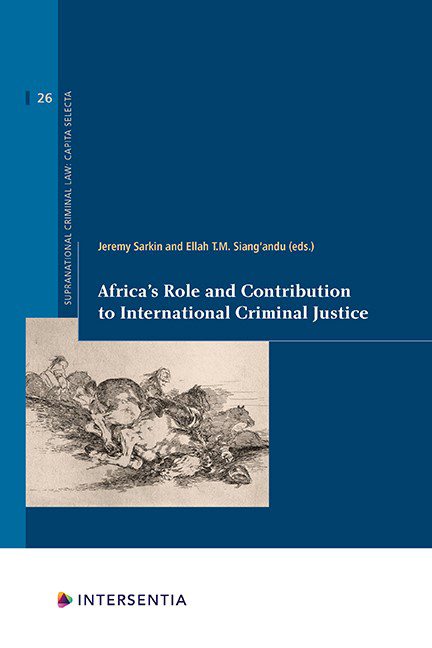Book contents
- Frontmatter
- Acknowledgements
- Contents
- List of Contributors
- Introduction: Understanding the Meaning, Context, Role and Importance of African Criminal Justice on the Continent and Beyond
- Types of International Criminal Courts in Africa
- The Extraordinary African Chambers in the Senegalese Courts and the Development of International Criminal Law in Africa
- The Use of International Criminal Law in African Countries
- The Nuremberg Principles in the Context of Africa: The Theory and Practice of Individual and Corporate Criminal Responsibility
- The Application of Universal Jurisdiction in Africa
- African Victims of Mass Atrocities Before Domestic Jurisdictions and the International Criminal Court: Bargaining for Justice
- The Role of the International Criminal Court in Africa: The Epic Fails?
- Is the African Court on Human and Peoples’ Rights with Criminal Jurisdiction an African Solution to an African Problem?
- Head of State Immunity in the African Context
- Index
Is the African Court on Human and Peoples’ Rights with Criminal Jurisdiction an African Solution to an African Problem?
Published online by Cambridge University Press: 11 February 2021
- Frontmatter
- Acknowledgements
- Contents
- List of Contributors
- Introduction: Understanding the Meaning, Context, Role and Importance of African Criminal Justice on the Continent and Beyond
- Types of International Criminal Courts in Africa
- The Extraordinary African Chambers in the Senegalese Courts and the Development of International Criminal Law in Africa
- The Use of International Criminal Law in African Countries
- The Nuremberg Principles in the Context of Africa: The Theory and Practice of Individual and Corporate Criminal Responsibility
- The Application of Universal Jurisdiction in Africa
- African Victims of Mass Atrocities Before Domestic Jurisdictions and the International Criminal Court: Bargaining for Justice
- The Role of the International Criminal Court in Africa: The Epic Fails?
- Is the African Court on Human and Peoples’ Rights with Criminal Jurisdiction an African Solution to an African Problem?
- Head of State Immunity in the African Context
- Index
Summary
INTRODUCTION
International criminal justice is facing trying times (Sirleaf 2016). It has many problems and faces many challenges (Hafetz 2017: 1133). This is particularly true of the International Criminal Court (ICC), which faces the wrath of the African Union (AU) as well as many African states because of its perceived bias towards African countries (Jalloh and Bantekas 2017). As a result, or maybe at least in part, the African Union intends to revolutionise (some say evolutionise (Abraham 2015)) the processes of dealing with criminal law by giving the African Court on Human and Peoples’ Rights (ACHPR) criminal jurisdiction (Oehm 2018). This is groundbreaking because usually criminal law is exercised by states. The common view was that until more recent times, criminal jurisdiction was always a foundational aspect of a state's sovereign rights. However, there are many examples of states giving up that right to other bodies over the centuries. While the perception is that historically only states had the ability and the authority to enforce criminal law, to prosecute those suspects who violated the law and to implement criminal sanctions (Romano, Nollkaemper and Kleffner 2004: ix), international institutions have had that authority on occasion. However, states have not given up such authority to a regional institution; it is only in more recent times (since the 1990s) that some new international criminal institutions have been established with such a mandate.
This is not the first time that international criminal jurisdiction has been exercised by a court. However, no international institution exercising criminal jurisdiction existed from the times of the Nuremburg and Tokyo trials in the 1940s until the International Criminal Tribunal for the former Yugoslavia was established in 1993. International judicial structures, characterised by the creation of the ICC, ad hoc criminal and hybrid tribunals, result in justice no longer being an exclusive and autonomous matter for states (Huneeus 2013: 1). However, no regional court has had criminal powers (Campbell 2018). Nonetheless, the move to give a regional body a criminal law mandate is in some ways a continuation of a trend to develop criminal processes external to states. The reformed African Court on Justice and Human Rights will become the first regional court with the ability to resolve cases concerning individual criminal charges (Huneeus 2013: 4).
- Type
- Chapter
- Information
- Africa's Role and Contribution to International Criminal Justice , pp. 225 - 258Publisher: IntersentiaPrint publication year: 2020
- 1
- Cited by



